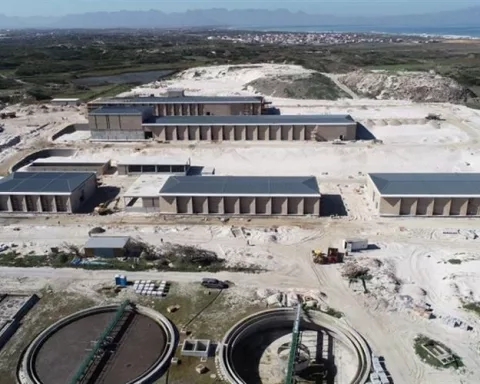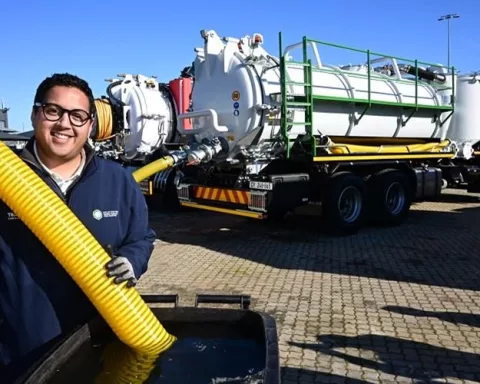Toilets in Cape Town’s RR Section informal settlement have been overflowing with waste for almost a month due to a local extortion group targeting the cleaning company responsible for maintaining the facilities. The group demanded money for protection and threatened to kill workers if they returned without paying. Residents have been left with no choice but to use alternative methods such as buckets or going outside. The situation highlights the negative impact of extortion on service delivery and the daily lives of residents, prompting Cape Town Mayor Geordin Hill-Lewis to initiate an Anti-Extortion Campaign.
What is causing overflowing toilets in Cape Town’s RR Section informal settlement?
The toilets in RR Section have been filled with waste for nearly a month due to the menacing behavior of a local extortion group targeting the cleaning company in charge of maintaining these facilities. The criminals demanded a large sum of money for the privilege of working in the area and threatened to kill the workers if they returned without paying for protection. The situation has left residents with no choice but to seek alternative methods such as using buckets or going outside.
In the RR Section informal settlement located in Khayelitsha, Cape Town, more than 200 toilets have been filled with waste for nearly a month. The primary reason behind this unhygienic situation stems from the menacing behavior of a local extortion group targeting the cleaning company in charge of maintaining these facilities.
Sanitech, the contractor appointed by the City of Cape Town, had to halt all operations in the region after workers were threatened at gunpoint by the extortionists. These criminals demanded that Sanitech pay them a large sum of money for the privilege of working in the area. Riaan Swartz, Sanitech’s regional director, disclosed that the culprits subsequently contacted the company’s office, threatening to kill the workers if they returned without paying for protection. Swartz emphasized that Sanitech, as a reputable service provider, would never participate in bribery and that the safety of its employees is of utmost importance.
The incident was brought to the attention of the Council, resulting in the involvement of the South African Police Service’s (SAPS) extortion unit. Until it is considered safe for workers to return with a police escort, the toilets will remain in their current unsanitary condition, leaving residents with no choice but to seek alternative methods such as using buckets or going outside.
Extortion Impact on RR Section Residents
The situation in RR Section continues to deteriorate. A janitor and resident of the settlement, who preferred to remain anonymous, has lost their job due to the extortion. They disclosed that some residents have taken it upon themselves to clean the toilets and lock them to prevent further use. Another resident expressed their disgust, specifically highlighting the need for people with disabilities to access these facilities.
Some individuals have resorted to walking long distances to find usable toilets in other informal settlements, while others have requested keys from those who possess them to access the few remaining clean toilets. Ward councillor Khayalethu Gxasheka has intervened, seeking chemicals from the City to aid residents in cleaning some of the toilets themselves. Gxasheka acknowledged the gravity of the situation, but pointed out that fear has made it challenging for community leadership to take action.
Zahid Badroodien, the City’s Mayco Member for Water and Sanitation, revealed that Sanitech received extortion threats on September 27. Following this occurrence, a meeting took place involving the ward councillor, service provider, and community members to discuss the issue and identify a solution that would enable service to resume while guaranteeing the safety of the workers.
Badroodien clarified that Sanitech is responsible for supplying chemicals as part of their contract with the City. Therefore, in response to Gxasheka’s request for chemicals, the ward councillor needs to follow up with Sanitech.
Cape Town’s Anti-Extortion Campaign and its Relevance
To tackle the growing issue of extortion in the city, Cape Town Mayor Geordin Hill-Lewis recently initiated an Anti-Extortion Campaign. This endeavor includes a 24-hour hotline and a rewards system to motivate residents to report extortion incidents in their neighborhoods. The City has stated that demands for “protection fees” are obstructing both basic service delivery and significant infrastructure projects, such as housing, roadworks, and transportation.
Although the exact number of calls to the hotline has not been disclosed due to the sensitivity of the data, it is clear that extortion has become a pressing issue in Cape Town. The city must confront this problem, as it not only affects service delivery and development projects, but also has a negative impact on the daily lives and well-being of residents, particularly in informal settlements like RR Section.
1. What is causing the toilets in Cape Town’s RR Section informal settlement to overflow with waste?
The toilets in RR Section have been filled with waste for nearly a month due to a local extortion group targeting the cleaning company in charge of maintaining these facilities.
2. What did the extortion group demand from the cleaning company?
The extortion group demanded a large sum of money for the privilege of working in the area and threatened to kill the workers if they returned without paying for protection.
3. Why did Sanitech halt all operations in the region?
Sanitech had to halt all operations in the region after workers were threatened at gunpoint by the extortionists.
4. How are residents dealing with the situation of overflowing toilets?
Residents have been left with no choice but to seek alternative methods such as using buckets or going outside.
5. What is the impact of the extortion on RR Section residents?
Some residents have lost their jobs due to the extortion, while others have to walk long distances to find usable toilets in other informal settlements. Some have requested keys from those who possess them to access the few remaining clean toilets.
6. What is the Anti-Extortion Campaign initiated by Cape Town Mayor Geordin Hill-Lewis?
The Anti-Extortion Campaign includes a 24-hour hotline and a rewards system to motivate residents to report extortion incidents in their neighborhoods. The aim is to tackle the growing issue of extortion in the city, which obstructs both basic service delivery and significant infrastructure projects.
7. What is the relevance of the Anti-Extortion Campaign to the situation in RR Section?
The situation in RR Section highlights the negative impact of extortion on service delivery and the daily lives of residents. The Anti-Extortion Campaign is relevant to the situation as it aims to confront this problem and provide a solution that would enable service to resume while guaranteeing the safety of the workers.
8. What is the responsibility of Sanitech in supplying chemicals to the toilets in RR Section?
Sanitech is responsible for supplying chemicals as part of their contract with the City. Ward councillors need to follow up with Sanitech to request chemicals for cleaning the toilets.












